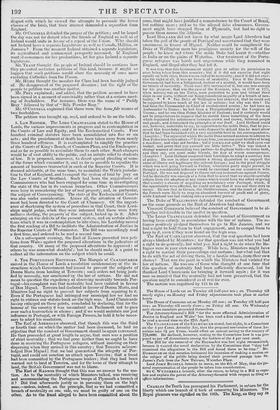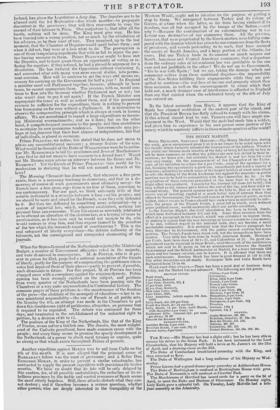CHARLES the Tenth has prorogued his Parliament, in return for
the liberty which one branch of it took of censuring his Ministers. The Royal pleasure was signified on the 19th. The King, as they say in Ireland, has given the Legislature a long day. The deputies are to be allowed until the 1st September—five whole months—to propagate
discontent in the provinces ; they will then reassemble to reap the reward of their labours in Paris. Our conjecture is, that after all the bustle, nothing will be done. The King must give way. He has been hurried into a wrong position, not so much by the absolutism of his advisers, as by their want of tact. They imagined, up to the last moment, that the Chamber of Deputies would quail before them ; and when it did not, they were at a loss what to do. The prorogation is one of those temporizing expedients that seldom fail to injure the par- ties having recourse to them. Prince POLIGNAC ought to have met the Deputies, and to have given them an opportunity of voting or re- fusing the supplies : if they refused, he had a plausible argument for a dissolution. He has irritated the Opposition without weakening it, and converted what with many was mere casual dislike, into perma- nent aversion. How will he contrive to get the ways ail means ne- cessary for carrying on the Government for half a year ? In England a minister must call Parliament together, because, although he have taxes, he cannot appropriate them. The revenue, with us, would con- tinue to flow into the treasury whether Parliament met or not ; but who would dare to pay it out again ? If the French Minister can appropriate the taxes as well as collect them, and if the permanent revenue be sufficient for the expenditure, there is nothing to prevent him from going on for ever without a Parliament. It is instructive to Observe the compensating principle which is always at work in humra affairs. We are accustomed to regard a large expenditure as favour- ing Ministerial encroachments ; and so it does ; but on the other hand, it compels frequent recourse to the people, and thus contributes to neutralize its own pernicious tendencies. Governments may per- haps at last,discover that their best chance of independence, like that of individuals, is placed in economy. Prince POL1GNAC, we notice, has stated that he does not mean to advise any unconstitutional measure ; a strange feature of the case. What would be thought of the Duke of WELLINGTON were he to autho- rize Mr. ROTHSCHILD to tell the gentlemen and Jews of Bartholomew Lane that he did not mean to have recourse to a forced loan ? Would not Mr. ROTHSCHILD advise an interview between his Grace and Dr. BURROWS? Yet the friends of Prince PoLiGNAC take credit for his moderation in declaring that he will not commit a breach of the laws ! •
The Morning Chronicle has discovered, that wherever a free press exists, there is a necessary tendency to democracy, and that in a de- mocracy of course all such governments must ultimately merge : the French have a free press, ergo there is no fear of them, according to our contemporary. For our part, we think extremely little of that notable instrument in a struggle between a king end his people ; and we should be sorry and afraid for the French, were they only defended by it. But they are defended by something more substantial—by a system of impartial law, which, wherever established, nothing but physical force can overcome. 'Were CHARLES so miserably infatuated as to attempt an alteration of the election-law, or a levying of taxes by proclamation, as it has been said he would not scruple to do, who would venture to obey him, and thus expose himself to the penalties of the law which the monarch aimed at overthrowing ? This is the real safeguard of liberty everywhere—the definite authority of the tribunals, not the unrecognized and unregarded clamouring of the journals.



















 Previous page
Previous page